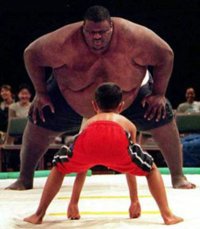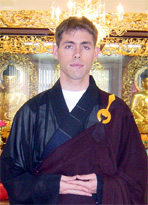Home » Literature Archives » Staying Involved
STAYING INVOLVED
by Yin Shan Shakya
When I was young, I learned a lot of Zen from an old prize fighter who used to shuffle down the street on his way to the gym every day. We kids called him "Punchy." For years I had forgotten his real name - if I ever knew it. But I remembered his advice. "Keep your attitude alive, kid." I was never sure I understood what it meant.
He had been a minor figure in prize fighting, middleweight division. As time passed, he became a sparring partner and finally a janitor. He came to the gym every day to sweep up, clean the showers and toilets and put fresh towels out. When there was nobody else in the gym he'd work out on the bag or jump rope. There was a weight room at the end of the gym and when we were old enough we got junior memberships. He never came down to our end; and he acted as though the place was empty if we were lifting weights. He'd keep on punching or jumping, training for a fight that would never come.
Within a few years we had all dispersed. I moved to another neighborhood and joined a branch of World's Gym near my home. I really got into the sport of weightlifting. I used to work out six days a week. It didn't take long for three other guys who were equally serious about the sport to form a mini-club with me.
Two of us were in school and the other two worked; but we all had one thing in common, we enjoyed working out. Sometimes we were motivated by vanity - we liked that "trim, muscular look." - and sometimes we just liked that nice release from the day's stress. We liked to keep fit, and we really enjoyed each other's company. All these things together were like glue to our little club - which we referred to as the Society of Gym Rats.

You get to the point in working out, as with every other successful team effort, where you feel the guilt of a missed workout.You failed to keep an appointment. But an even more overwhelming feeling of guilt came with the sense of disappointment you'd feel by realizing that you'd let yourself and the others down by missing the workout. Weightlifting isn't a team sport like baseball or basketball. There's no meshing of gears, a machine with all its parts performing as needed. It's more isolated in its objective... the difference between a wolf pack and an eagle. Yet in the isolation there is still communion.
I only missed a few workouts in a two year period, but I remember how bad I felt about it. The others, too, missed a workout occasionally, and they'd apologize profusely when they wandered in the next day. With no formality whatsoever we had become a kind of team, and because of this we were able to succeed in our own goals and with the group's goals as well... we couldn't, and we wouldn't, let each other down.
Life has a funny way of changing without anyone noticing There's a natural pattern of growth in all of our endeavors. If we were privy to this knowledge - if we could actually see it taking place - we could include any of life's events into our growing process. This would allow us to be a part of these changes and to grow and mature along with them. But we had no provision for adaptation.
We all knew that we'd move on in our lives, that we'd graduate from school, or get married, or get another job; but what we didn't know was how those changes would affect our relationship to our sport.
Our group slowly dwindled. One got married and one joined the service and then as the Society of Gym Rats became a pair of rogue rats who tried to keep up the camaraderie but couldn't quite cut it, the news came that even we were in the flux. I was accepted at another school for some graduate work and the remaining member got engaged. We were not even the lone survivors anymore.
We all said we'd keep in touch, but we didn't. I stopped lifting weights and gained thirty pounds. At a football game I ran into two of the others and saw they they had gained even more. They weren't working out either. Worse, they told me about Gym Rat Number Four. He had put over a hundred pounds on and was being treated for the early stages of diabetes. I supposed we had all become a little disappointed and depressed. The safety of regular habits can't be underestimated.
It bothered me that I had lost something that was truly valuable to me. I wanted to know why. I wanted to understand. I got in my car and drove nearly two hours back to my old neighborhood. The old gymnasium had been torn down but the shoe repair shop was still there and so was the apartment over it. The name under the doorbell said "E. McDonough" and I wondered if this was Punchy's real name. I just couldn't remember. I rang the bell. A head came out of the upstairs window and a voice called down, asking who I was and what I wanted. I told him. It was Punchy, ten years older but still strong.
We had a beer together at the kitchen table and talked about old times. I told him about our collective fat. "It isn't that you gained your fat," he said, "it's that you lost your sport." I gave him the old excuse of study hours and social needs and just growing up as I grew away.
"I remember you," he said. "I remember telling you all the time to keep your attitude alive. You didn't do that. You let your attitude towards your sport die. You didn't have to do that."
And then I did remember that cryptic salute of his... "Keep your attitude alive, kid."
He leaned across the table and picked up a jumping rope that was hanging on the back of a chair. "See this rope? I use it every day. Rain, snow, I don't care. I'm out there because I love my sport. In the other room I've got a punching bag. I use that every day too. For awhile I was sick. Had three operations and couldn't do it. I was in the Veterans' hospital and got one of the nurses to pick me up boxing magazines every week. Every fight night I got wheeled into the TV room to watch the fight on cable. I watch it here, too. I'd read the sports' pages like some folks read the Bible. Just because I couldn't go to my sport didn't mean my sport couldn't come to me. I kept my interest up; and the moment the doctor gave me the green light, I was back on the canvass... back at the bag... tossing the medicine ball around." He sighed. "Then they tore the gym down." He thought for a moment and added, "But just because you can't go to the sport, doesn't mean you have to leave it behind in your mind... and then 'cause you feel guilty, start inventing reasons for not going. You punish yourself by getting flabby, and buildin' up a resistance to the sport... putting it down... like something that got rotten in your hand."
All the way back home I could think of nothing else but the Zen lesson I had received. There is often zealotry in being a convert to a creed. There is an opposite state of mind in being a "fallen away" believer in a creed, in "backsliding." I knew people who left their Buddhist sanghas. Something happened that prevented them from going at a certain time, so instead of taking their Zen with them, they abandoned Zen. They let their attitude die. Next thing they would talk about Zen with disgust... as if it were a rotting corpse in the corner. I could understand that martial arts or any sport that we attend on a regular basis is the same thing. Suppose there comes a period in our lives in which we simply can't afford lessons, either the money or the time. Do we have to give up the sport because we can't go to the gym or the dojo? It's the same thing.
We need to keep our attitude alive by reading magazines about our sport, or seeing movies about it, or if we're physically able, just by going to the park or our back yard and doing our sport routines... keeping up with it. Too many people think that Buddhism is something they do. It isn't. It is something they are.
That's what Punchy had been trying to tell me. He didn't do boxing. He was a boxer. His attitude was different because the sport was as intrinsic ally a part of him as his elbows. He didn't show off for other people, he did what he did for himself, for what it meant to him... to be healthy, to be constructively occupied, to be aware of other people rather than be worrying about how much people were were aware of him. And that was it in summation. When the doctor gave him the 'green light' he didn't go back to boxing, he never left it.
When I got home I called the nearest gym. I've been going three times a week for the last two months.

